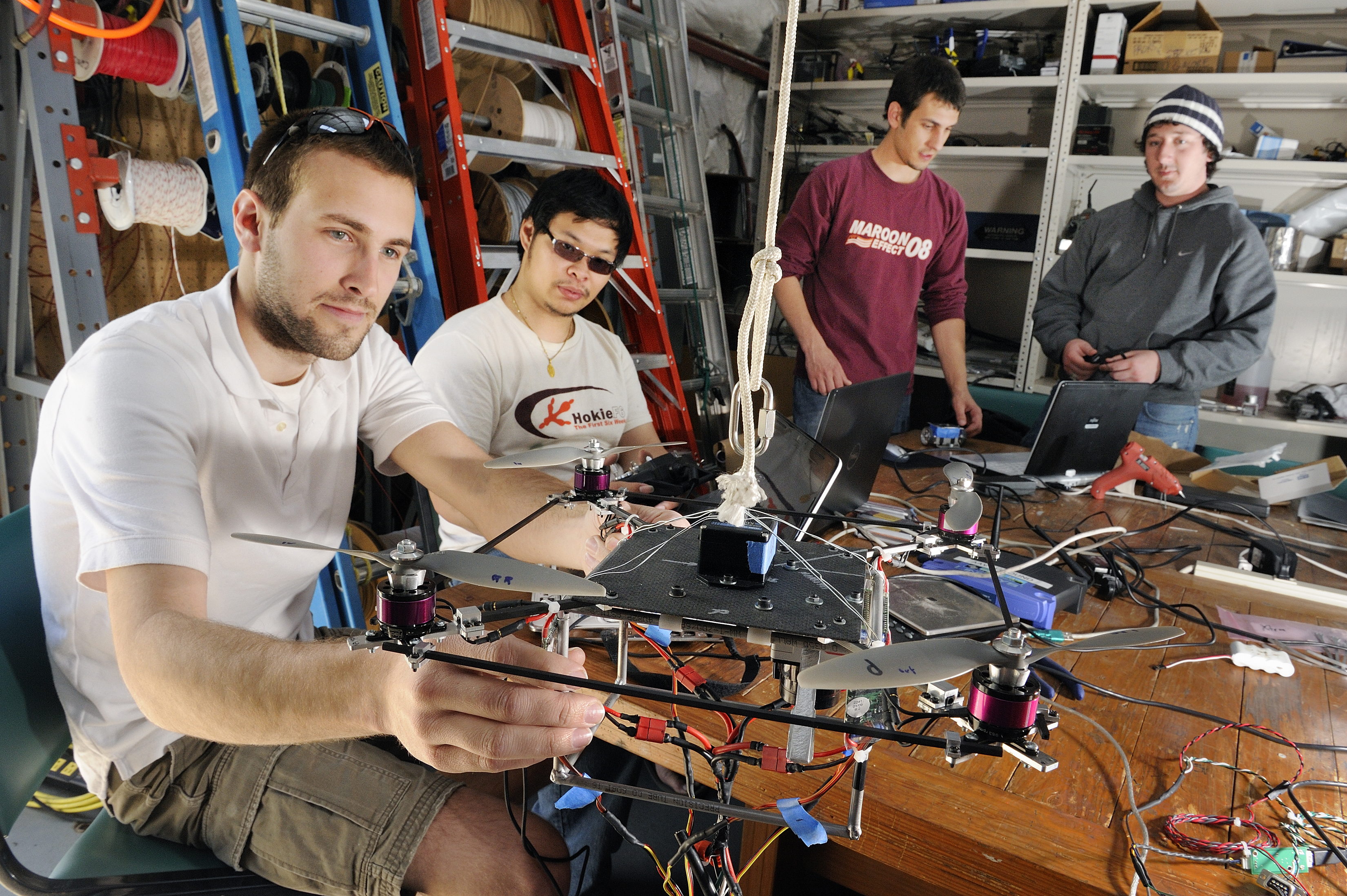Virginia Tech College of Engineering moves ahead in Best Graduate Schools survey by 'U.S. News'

Virginia Tech's College of Engineering continues to climb higher among the nation's 25 best engineering schools for graduate studies, according to U.S. News and World Report’s America’s Best Graduate Schools 2012 survey.
The latest annual survey ranks the College of Engineering at 24, one place ahead of its 2011 ranking. It’s among the highest ranking the college has ever held on this list, with the college listed as 23rd in 2002. Six individual Virginia Tech engineering graduate programs rank in the top 15 of their field, according to the survey, released today.
“Our College of Engineering’s outstanding reputation has always stemmed from the extraordinary talent of our faculty, who help guide and work closely with our graduate students in such diverse fields as green supercomputing, creating the technology that allowed a blind man to drive on a racetrack, and the intricacies of how an airborne virus can spread,” said Richard C. Benson, dean of the College of Engineering. “These are but a few of the many extraordinary projects that our engineering family is spearheading, all in the name of Virginia Tech’s motto, Ut Prosim (That I May Serve).”
Boasting some 2,000 graduate students, the College of Engineering’s graduate program ranked 25th in the 2011 survey, and 28th in the 2009 listing. This year it again ranks as the highest ranked engineering school in the Commonwealth of Virginia. Among fellow public universities, it ranks 13th in the nation.
By individual program, the Charles E.Via Jr. Department of Civil and Environmental Engineering ranks ninth among civil engineering programs, with the environmental engineering program tying for seventh; the Grado Department of Industrial and Systems Engineering ranks fourth for industrial/manufacturing programs; the biological systems engineering department, also part of the College of Agriculture and Life Sciences, ranks seventh among biological/agricultural programs; mechanical engineering ranks14th in its division and the aerospace program ranks 15th, tying with the University of Minnesota-Twin Cities.
The College of Science’s paleontology program ranks ninth in nation, while the earth sciences program ranks 28th overall. Both programs are part of the geosciences department and held the same rankings in the 2011 survey.
“The Department of Geosciences is known worldwide and has consistently been ranked among the best geosciences programs in the nation for more than 20 years,” said Lay Nam Chang, dean of the College of Science. “Research conducted by our renowned faculty members and students covers significant aspects and provides critical understanding of the dynamics of the earth. Exciting discoveries are being made that will ultimately change the way we think about our planet’s history, resources, and all major societal concerns. These rankings confirm what we already know about the quality of our programs in the College of Science.”
Also in the College of Science, the clinical psychology program ranks 33rd for the third consecutive year, according to the new report. The program is fully accredited by the American Psychological Association and is a member of the Academy of Psychological Clinical Science Programs.
The public affairs program in the School of Public and International Affairs, part of the College of Architecture and Urban Studies, ranks 27th in the nation for the third consecutive year. It ties with Georgia State University, the University of Nebraska-Omaha and the University of Pittsburgh. The public administration/management program, also in the College of Architecture and Urban Studies, ranks 13th place, tying with the University of Washington.
“The college is pleased to have its Center for Public Administration and Policy remain in the top quarter percentile in a field of 123 ranked programs nationally,” said Jack Davis, dean of the college and the Reynolds Metals Professor of Architecture. “In addition being ranked for the first time in the top 20 programs in Public Management Administration is an indication of successful academic progress to be credited to both the quality of our faculty and the commitment of our students.”
The Career and Technical Education graduate program in the College of Liberal Arts and Human Sciences’ School of Education ranks fourth among vocational and technical specialties for the third year in a row. It has placed among the top-five for nine consecutive years. Over all, the School of Education ties for 100th in the nation, ranking alongside Hofstra University, the University of Alabama Birmingham and the University of Maine.
"Virginia Tech’s School of Education, including the highly-ranked technical and vocational education program, extends faculty expertise beyond the local and regional school systems and into the international education arena, particularly throughout the continent of Africa," said Dean Sue Ott-Rowlands.
Virginia Tech’s Pamplin College of Business ranks 45th among the nation’s best part-time MBA schools, according to the 2012 survey. The College of William And Mary, also located in Virginia, is tied for the same rank.
U.S. News and World Report’s graduate rankings of colleges, published annually since 1987, are based on several categories of data gathered from the surveyed schools, plus peer assessments by deans, senior faculty, and other professionals in their respective fields. Rankings of the specialty programs are based solely on peer assessments. The annual survey is intended to provide prospective students with information about the nation’s top graduate schools and programs of study.
Dedicated to its motto, Ut Prosim (That I May Serve), Virginia Tech takes a hands-on, engaging approach to education, preparing scholars to be leaders in their fields and communities. As the commonwealth’s most comprehensive university and its leading research institution, Virginia Tech offers 240 undergraduate and graduate degree programs to more than 31,000 students and manages a research portfolio of $513 million. The university fulfills its land-grant mission of transforming knowledge to practice through technological leadership and by fueling economic growth and job creation locally, regionally, and across Virginia.




